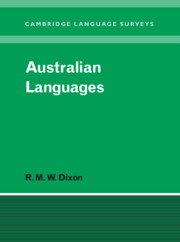Book contents
- Frontmatter
- Contents
- List of maps
- List of abbreviations and conventions
- Preface
- Acknowledgements
- Conventions followed
- List of languages and language groups
- 1 The language situation in Australia
- 2 Modelling the language situation
- 3 Overview
- 4 Vocabulary
- 5 Case and other nominal suffixes
- 6 Verbs
- 7 Pronouns
- 8 Bound pronouns
- 9 Prefixing and fusion
- 10 Generic nouns, classifiers, genders and noun classes
- 11 Ergative/accusative morphological and syntactic profiles
- 12 Phonology
- 13 Genetic subgroups and small linguistic areas
- 14 Summary and conclusion
- References
- Index of languages, dialects and language groups
- Subject index
6 - Verbs
Published online by Cambridge University Press: 22 September 2009
- Frontmatter
- Contents
- List of maps
- List of abbreviations and conventions
- Preface
- Acknowledgements
- Conventions followed
- List of languages and language groups
- 1 The language situation in Australia
- 2 Modelling the language situation
- 3 Overview
- 4 Vocabulary
- 5 Case and other nominal suffixes
- 6 Verbs
- 7 Pronouns
- 8 Bound pronouns
- 9 Prefixing and fusion
- 10 Generic nouns, classifiers, genders and noun classes
- 11 Ergative/accusative morphological and syntactic profiles
- 12 Phonology
- 13 Genetic subgroups and small linguistic areas
- 14 Summary and conclusion
- References
- Index of languages, dialects and language groups
- Subject index
Summary
There are three main parameters of variation for verbs in Australian languages – compounding, transitivity and conjugation. In §6.3 we discuss compounding, whether a language has a large number of simple verbs, that take verbal inflections, or just a small number of inflecting verbs, each of which occurs in compounds with a number of non-inflecting verbal forms, that I call coverbs. §6.4 discusses valency-increasing derivational suffixes on verbs (and verbalising suffixes on nominals) and how they may have evolved.
In most Australian languages each verb belongs to one of two transitivity classes – strictly transitive and strictly intransitive; this is discussed in §6.1. In over 70 per cent of the languages there is an independent parameter – a set of between two and a dozen or more conjugational classes. Each verb takes the inflectional allomorphs appropriate to one (very rarely, more than one) conjugation class, as discussed in §6.5. There is generally a correlation – but not a correspondence – between conjugation class and transitivity; that is, most of the members of a given conjugation class have a certain transitivity value. Only in a handful of languages has conjugation come to coincide with transitivity.
The varying techniques which Australian languages employ for adverbal modification of a verb are briefly mentioned in §6.2. In §6.6 we discuss the transference of nominal inflections onto verbs (through an intermediate stage of nominalisation). Finally, §6.7 briefly covers verbless clause types, and copula verbs.
- Type
- Chapter
- Information
- Australian LanguagesTheir Nature and Development, pp. 176 - 242Publisher: Cambridge University PressPrint publication year: 2002



